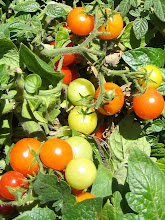I wrote the other day about the film The Economics of Happiness, with the central theme being relocalising for a resilient community. On Friday, I had a wonderful “local” day in my Melbourne suburb of Coburg.
I was working from home, and when feeling peckish for lunch, I went around the corner to my local Lebanese bakery, Akaar Bakery. Those who know Melbourne know Coburg is a Middle Eastern heartland. I don’t know much about Lebanese bakeries, so most of it is new to me. I picked the Lebanese omelette and the Herb Pizza (I think thyme is the main ingredient, plus sesame seeds). It’s clearly a family business with only the young man looking after the store, who quickly put them in the oven for me. Weekends mean quite a few people are behind the counter and in the kitchen. He made small chit chat, asking if I liked the omelette (beaten egg, poured onto the pizza and baked). I admitted I’d never eaten it before, but am working my way through their menu, though the Herb Pizza is a firm favourite already. I unexpectedly got a discount!
Later in the afternoon, I headed off for the local hardware store (not Bunnings, nor Coles, who both stock what I was after but buying there means most of the price goes out of the local area). Charalambous Hardware is a small shop front. On entering, I was amazed at how much stock they had managed to have in the store. Let’s say that vertical space was well used. The dusty front window is not a reflection of the order found inside. I quickly concluded this was a store to ask for the item not self-service (half the stock seemed to be behind the counter anyway), but before I got to the counter I was distracted by the seed packets – Australian and Italian. Not the run of the mill varieties.
After the gentleman assisted me in finding a watering can and spray bottle, he began quizzing me on gardening. Do I garden? What do I grow? What specific vegetables do I grow? Do I eat salad? Increasingly getting more specific and I think I must have passed a small test, as he then offered me Japanese salad seeds. Wow! He described the vegetable, a green and brown coloured leaf with bite, the seeds of which he was given by a family member. So I’ll go back this week and pick up the seeds. How lovely! Not an offer I would have got in a chain or supermarket!
I saw across the road a shoe store, Quik Shu. I had seen their advertisement in the local paper as it had a closing down sale (closes Friday 27 May 2011, with the Moorabin store remaining). I walked in to the sound of Italian babbling away by the older ladies. As the sale was on, I decided to buy some bright blue leather shoes for a bargain price.
On the walk home, I popped in to a Lebanese sweet shop for some Turkish Delight. The family must live behind shop, as I learnt early on in my move to Coburg that with a ring of the doorbell they would open the shop (they did put this on the sign). It is a simple, small white tiled shop with quite a few platters of sweets behind a glass cabinet. Yum!
So that is what it means to have a local day in Coburg! Very satisfying.






